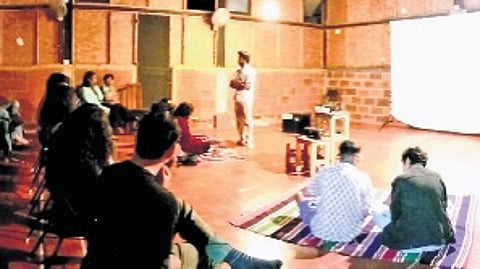

BENGALURU: Indian film, if it can be brought down to an industrial homogeneity, is an entity that often creates its own perils. With the Film Federation of India proverbially shooting itself in the foot by snubbing Payal Kapadia’s All We Imagine As Light for the Oscars, Bollywood on the other hand seems to have admitted a quiet death whose primary symptom is characterised by a regurgitation of old films.
With such a saturation, the discerning Indian audience is left with little hope. This is precisely the context where the need of a collective which understands cinema, art, and human necessities, is felt the most. Film clubs in B’luru, perhaps under the radars of most in the city, have been working with a common ambition to keep
cinema alive. The genesis of most of them can be traced around or after the pandemic. Vinayak Bhat, founder, Bangalore Film Forum, says, “This ‘thing’ started after the pandemic. Before the pandemic I would go to local film societies, film clubs, and not all of them come back after it. It felt that was the right moment [to start my organisation].”
Nikhil Waiker, founder, Parallel Cinema Club locates the origin of his club to a simple, communal love for cinema, saying, “There was no particular directive when it started back in March ’21. It was a bunch of friends with access to a science auditorium and we just watched films we liked. As a club, we explore themes around art, film movements, directors etc, thereby making the curation a complete unit of itself.”
Anand Varadaraj who is an executive committee member at Suchitra Film Society, one of the oldest film organisations in the city, states that ‘being part of Suchitra helped me understand the film festival space’. He continues, “I focused on inclusivity, ensuring films represented diverse communities, and facilitated screenings, workshops, and discussions to make the club both an artistic and educational hub. A mix of grassroots outreach, leveraging technology, and offering niche content attracted participants and filmmakers.”
No organisation can exist without an ethics of conduct, and film clubs are no exception. Varadaraj shares this vision clearly, “Encouraging ethical consumption involves fostering awareness about the origins and implications of the art we consume.
This could include hosting post-screening discussions to highlight themes like representation, copyright ethics, or the exploitation of marginalised groups, celebrating the authenticity of regional voices, which are often overshadowed by mainstream cinema, urging audiences to value original narratives over mindless remakes, and supporting critics who spotlight ethical practices.”
Waiker, whose The Parallel Cinema Club has garnered traction in Bengaluru and Hyderabad, understands keenly the role of film in community building. “Film societies should be a place for people to come and appreciate films while they sit together.” He also seeks to work closely with educational institutions and establish similar frameworks.
“The intent with collaborating with colleges is that we can help colleges and universities set up and maintain ecosystems of students introducing themselves to what cinema can be outside of their own curriculum or what they generally watch,” he says.